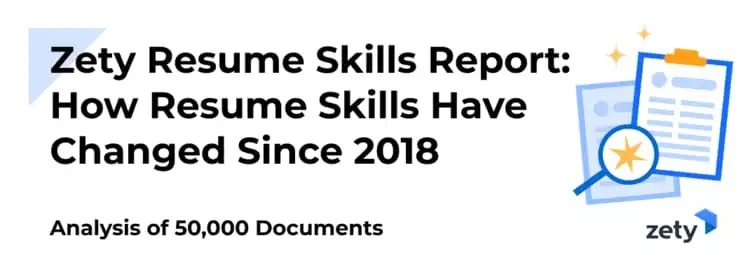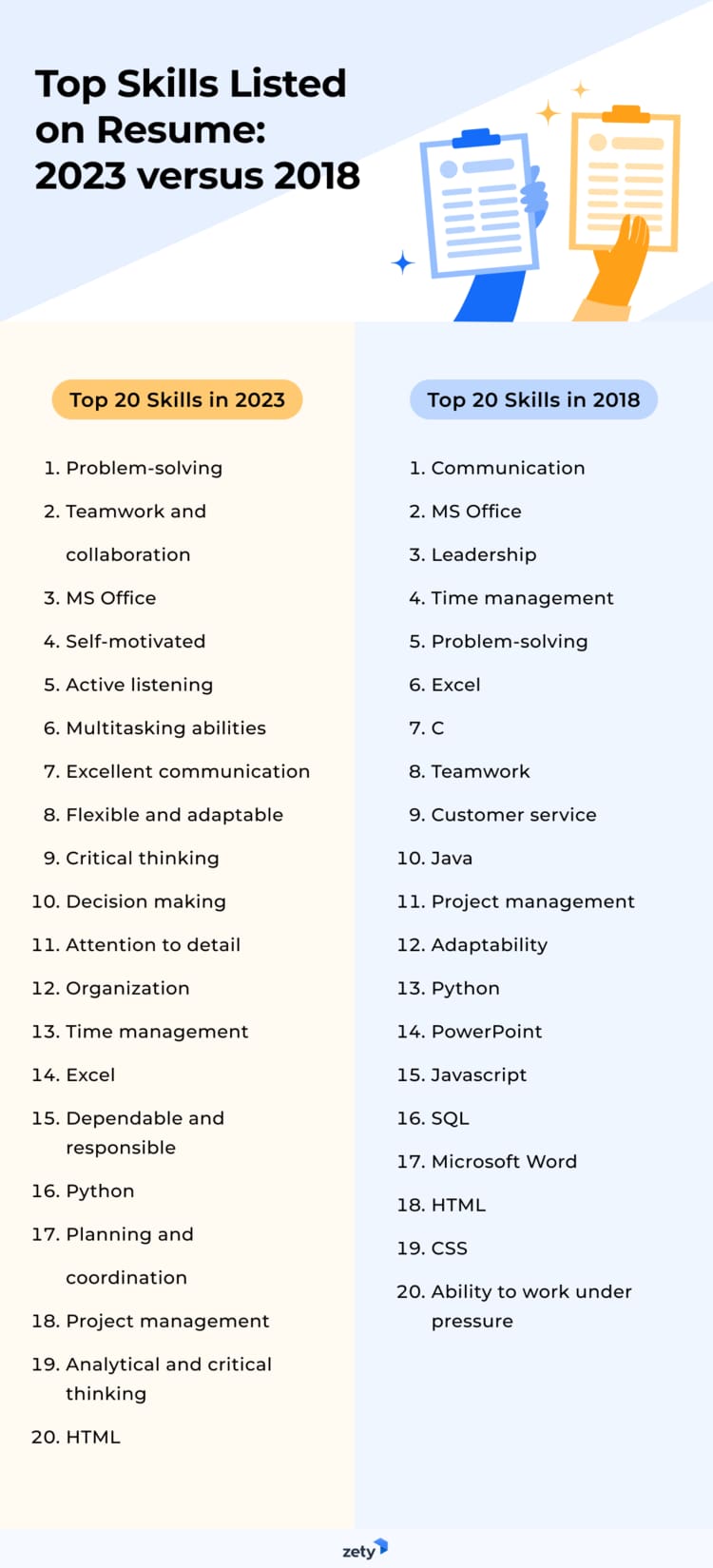
The last five years have been a bumpy ride for many job seekers. The COVID-19 pandemic hit the workforce like an explosion, one that devastated some industries, like hospitality and restaurants. It also created other seismic shifts, including a financial crisis, a challenging job market and a move towards more remote work.
These factors have worked together to change the employment landscape and impacted job seekers' approach, changing the rules of how to write a resume. Most notably, the skills job seekers highlight on their resumes have changed significantly.
To get a better picture of this impact, analysts at Zety extracted and examined raw data from 50,000 resumes from its internal database to compare resumes crafted in 2018 to resumes written in 2023. The results show that job seekers have switched the focus of their resumes from hard – or technical – skills to an emphasis on soft skills.
Here are our Resume Skills Report: Hard and Soft Skills, 2018-2023 results.
A Swing Towards Soft Skills

Historically, job seekers have emphasized hard skills, the measurable and teachable technical skills required to perform a job, to show employers they have the skills it takes to succeed.
In fact, five years ago, more than 50% of the skills job seekers listed on their resumes were hard skills. Specifically, in 2018, 11 out of the top 20 skills listed were hard skills, including PowerPoint, Excel and various coding languages.
But analysts examining resumes written in 2023 found that soft skills – or the behaviors and personality traits, like communication or problem-solving skills, that make you great at your job – dominated the list of Top 20 skills job seekers were using.
Job seekers had begun listing soft skills, like problem solving, teamwork and collaboration, more often than they mentioned hard skills on their resumes. In fact, in 2023 only 20% of the Top 20 skills listed on resumes are hard skills. The other 80% consisted of soft skills.
How Skills Have Shifted: 2023 versus 2018
|
Top 20 Skills in 2023 |
Top 20 Skills in 2018 |
|
1. Problem-solving |
1. Communication |
|
2. Teamwork and collaboration |
2. MS Office |
|
3. MS Office |
3. Leadership |
|
4. Self-motivated |
4. Time management |
|
5. Active listening |
5. Problem-solving |
|
6. Multitasking abilities |
6. Excel |
|
7. Excellent communication |
7. C |
|
8. Flexible and adaptable |
8. Teamwork |
|
9. Critical thinking |
9. Customer service |
|
10. Decision making |
10. Java |
|
11. Attention to detail |
11. Project management |
|
12. Organization |
12. Adaptability |
|
13. Time management |
13. Python |
|
14. Excel |
14. PowerPoint |
|
15. Dependable and responsible |
15. Javascript |
|
16. Python |
16. SQL |
|
17. Planning and coordination |
17. Microsoft Word |
|
18. Project management |
18. HTML |
|
19. Analytical and critical thinking |
19. CSS |
|
20. HTML |
20. Ability to work under pressure |
New Soft Skills Emerged in 2023
In 2018, the soft skills listed on resumes were fairly typical – like communication, leadership and time management. In 2023, job seekers became more sophisticated in the variety of soft skills they added to their resumes.
Here are some notable changes:
- Problem solving skills appeared at the top of the list, with 4.2% of job seekers adding the skill to their resumes, compared to 2.6% in 2018.
- Teamwork and collaboration also made a big jump toward the top of the list, from #8 in 2028 to #2 in 2023. That jump saw 4.1% of job seekers adding it to their list of skills in 2023 compared to 2.2% of applicants in 2018.
- In 2023, 13 times more job seekers added self-motivation to their resume than in 2018.
- Additionally, active listening was mentioned 33 times more often on resumes in 2023 than in 2018, making it #5 on the list of popular skills.
- Conversely, customer service, which in 2018 ranked #7 on the list of skills job applicants added to their resume, dropped off the top 20 altogether, as did leadership and adaptability.
- Some skills stood the test of time. Communication and teamwork skills are included on resumes as frequently in 2023 as did in 2018, suggesting that these skills are in high demand across all industries.
- Leadership, the second most listed skill in 2018, significantly waned in popularity when we examined resumes written five years later. In 2018, 3.2% of job seekers listed it on their resumes, but in 2023, just 1.7% did, dropping it down to #31.
- Other newcomers to the Top 20 list of skills in 2023 include multitasking abilities, critical thinking, decision-making, attention to detail, organization, and analytical and critical thinking.
Other Changes to Resume Writing
Skills weren’t the only parts of the resume that changed between 2018 and 2023. There were also changes to word count and a bevy of changes to the special sections applicants are adding to their resumes.
Here are the highlights of the analysis:
- Resumes have gotten longer. The average word count of resumes built on Zety in 2023 was 286, compared to 234 in 2018.
- Applicants in 2023 were four times more likely to include a section listing their hobbies and interests than in 2018.
- In 2023, 14% of job seekers added a special section to their resumes to highlight their professional certifications.
- Eight percent more job applicants add languages to their resume than in 2018. However, when it comes to foreign languages, applicants in 2023 still miss an opportunity to flaunt their skills, with 74% of resumes lacking information about foreign language proficiency.
- The addition of certifications to resume was up in 2023 by 6%. The most popular certifications were CPR & First Aid, SCRUM Master Certification, and CNA Certification.
- A special section for listing accomplishments became more popular in 2023. While no job seekers used a section with that header in 2018 (0%), in 2023, 11% of job seekers did so.
Conclusion
The shift towards soft skills in resumes reflects changing priorities in the job market, possibly influenced by the COVID-19 pandemic and the rise of remote work. Job seekers now emphasize qualities like problem-solving and collaboration alongside traditional skills to convince potential employers that they have the skills and personality traits needed to work more independently and do the job.
Additionally, changes in resume writing, such as increased word count and the addition of new sections, suggest that applicants are taking a more comprehensive and personalized approach to presenting their qualifications. These changes to resume writing are likely a response to job seekers' current challenges in the job market and an attempt to make their resumes stand out from the competition.


